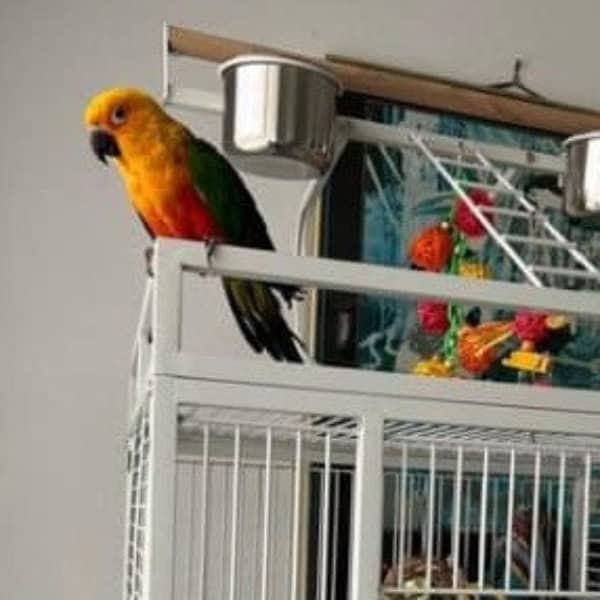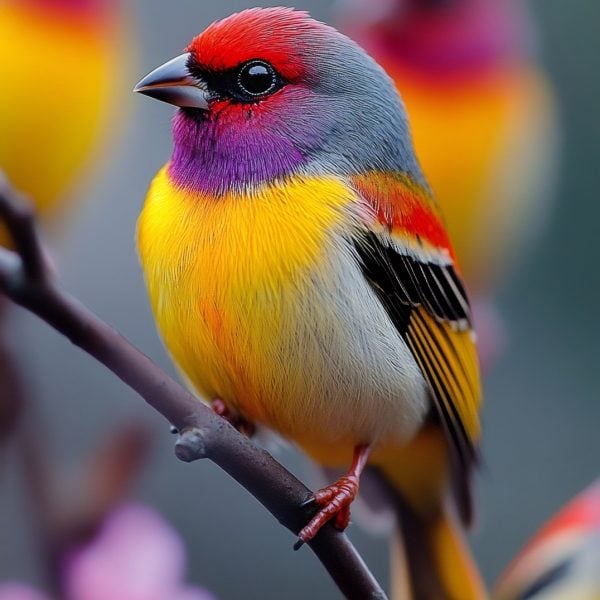Last Updated on by Mitch Rezman
Good Morning,
Yesterday morning my nearly 17-year-old Jenday, Kiwi laid an egg.
We adopted her nearly 2 years ago from a friend who raised her until she was 15 from where she was little and could not even perch!
During those years, Kiwi laid many eggs.
But with me this is the first.
I am not sure what to do today as I found her this morning sitting on it keeping it warm and I am worried she will grieve when nothing happens.
Should I remove the egg? She spent a lot of time yesterday doing the same. She is a wonderful bird and always sweet and happy and I want her to stay that way.
Also, I want to be sure she has enough calcium in case this happens again which I hope it won’t.
Please advise.
Thank you,
Janet
Dear Janet
Between January and April yearly we get all sorts of emails from people with hormonal birds.
Some are females laying eggs, others are males who have gotten aggressive and are lashing out.
Thankfully that time is almost up and our birds will usually return to normal.
But some do seem to hang onto their hormonal behavior longer and it can affect their health.
Between the calcium used for egg production and other bodily resources used to replace feathers pulled at this time of year, it can be physically hard on them.
Yes, a calcium supplement added to your bird’s water is a very good idea. And if your bird is eating a seed-based diet, then a good Multivitamin may also be a good addition.
If you feed mainly pellets, then a multivitamin is really not needed. But the calcium is.
We have had our own experience with a chronic egg-laying cockatiel which after dealing with Lupron shots and dummy eggs,
We found a real solution. LIGHT.
Most of the pet birds in our home don’t get much light.
Parrots are tropical and as such, their brains are used to having a bright light (the sun) on them a minimum of 12 hours a day.
Less than that and their brains feel it is time to find a mate and raise a family.
Yes, they can still lay eggs without mating if their brains have triggered this action.
We have found with the research by Harrisons and Hagen (both major bird food producers) that if a bird is placed under a bright light for 72 hours straight, the pineal gland is affected through the eyes and it helps to reset the circadian rhythm and the birds lose their interest in broody behavior.
The bulbs do not need to be pricey UV bulbs, they just need to be bright, daylight types.
We take the bird and put her in a small cage (to best offer bright light) place the light directly over the cage, as close to the bird as possible, and leave it one for 3 days and nights.
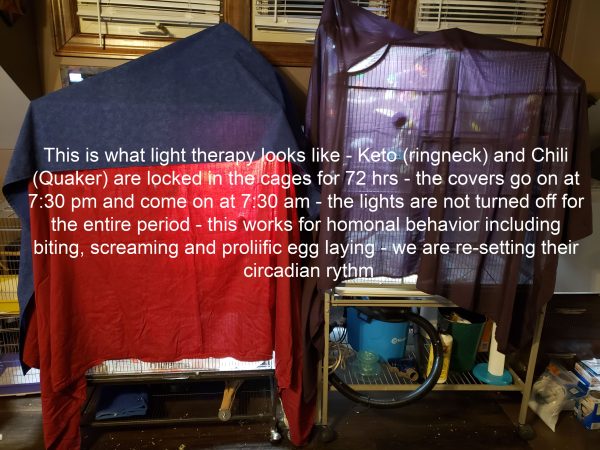
The bird can eat, sleep, play, etc as normal.
They just must remain under the constant light.
After 3 days (72 hours) the bird usually loses interest in nesting, eggs, etc. If not, it can be repeated up to 7 days.
It sounds drastic, but it isn’t.
The bird does not have to be injected with anything, and afterward, will go back to normal behavior.
However, after the treatment, you must keep the light above their cage and set it on a timer for 12 hours on and 12 hours off, forever.
This will help keep the hormones in check. You are replicating the Australian sunshine in the summer, year-round. Birds don’t mate, breed in the summer.
Please let me know if you have any questions and please let us know how it works out.
Hi Catherine,
Dear Janet
Oh yes, my apologies for skipping this important information.
What can cause her (or any hen) to lay?
- Darker than normal lighting in her cage
- Too many shreddable toys and the piling up of the shreds
- Toys that lay on her back
- Too many balls
- Too much food. Don’t leave full dishes 24 hours a day. Instead, offer a 1/4 cup of any dry food. You can pull food before bed and return it in the morning.
- Too much petting below the neck. Birds only have contact below the neck when they are going to be choosing a mate and mating. Otherwise, neck and up only for preening as they can’t do it themselves.
- Another male bird in the house.
- It does not have to be the same species to affect her.
Hi Catherine,
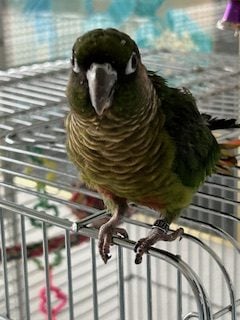
Dear Janet
Yes, it looks like the male GCC is the catalyst that has caused Kiwi to become hormonal.
Birds do not have to be the same species or in the same cage to affect each other hormonally.
He may have been near her before without issue, but something has caused it all to click, and boom, she is responding by producing an egg.
By the way, she may lay a couple more before her cycle ends. Just keep removing them.
That you have a male near her, may continue to trigger egg laying.
I DO recommend light treatment for her.
But as she is near the male, over time, her hormones will kick back in resulting in another clutch.
We know birdkeepers who do have to repeat the treatment a few times a year.
Be sure to get that calcium into her water daily.
Best of luck
Catherine
Author Profile

Latest entries
 Bird & Parrot CareJune 20, 2025Understanding the Best Way to Use Prevue Pets Mimic Me Voice Trainer
Bird & Parrot CareJune 20, 2025Understanding the Best Way to Use Prevue Pets Mimic Me Voice Trainer Bird BehaviorJune 6, 2025How Do I Keep My Parrot From Dumping His Food Every Day?
Bird BehaviorJune 6, 2025How Do I Keep My Parrot From Dumping His Food Every Day?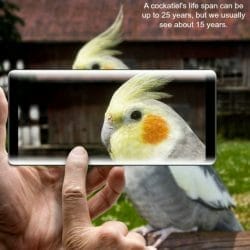 Birds & LightingMay 16, 2025I Am Seeking Clarity About Lighting for My Birds Cage
Birds & LightingMay 16, 2025I Am Seeking Clarity About Lighting for My Birds Cage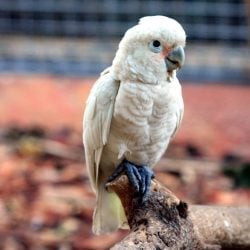 Bird RescueApril 29, 2025How Do We Re-Home a 17 yr Goffin Cockatoo?
Bird RescueApril 29, 2025How Do We Re-Home a 17 yr Goffin Cockatoo?
